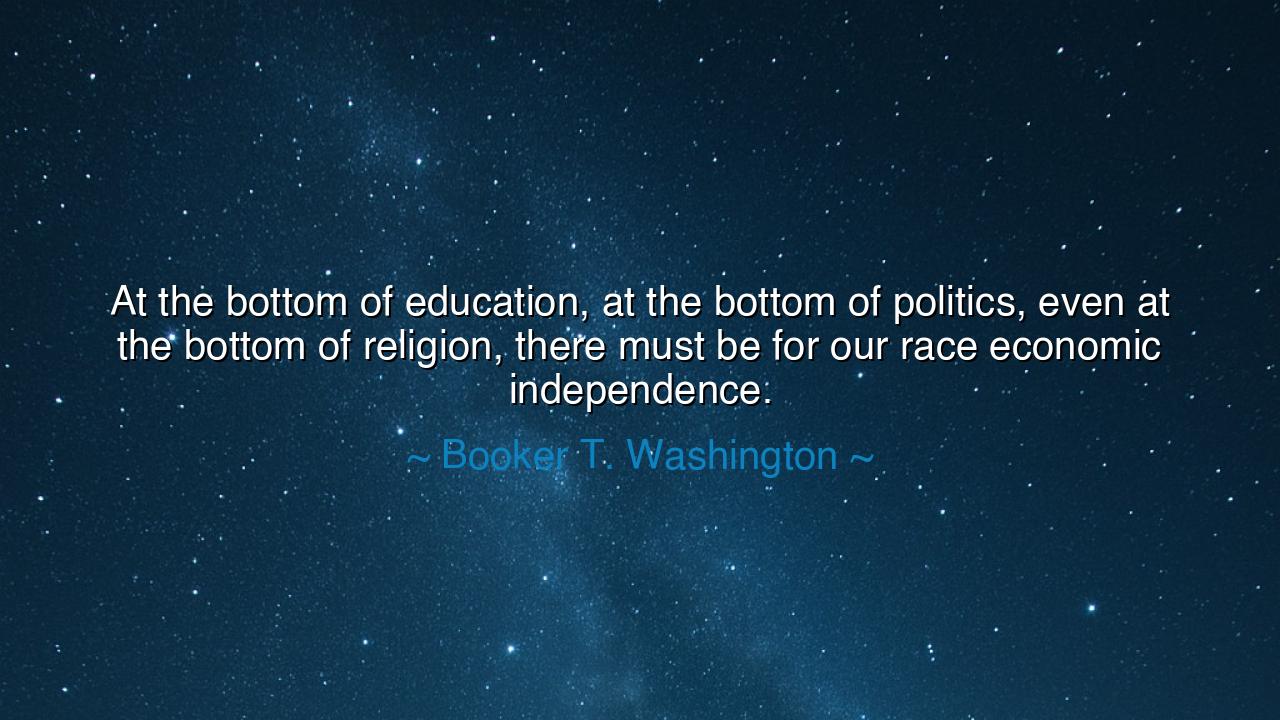
At the bottom of education, at the bottom of politics, even at
At the bottom of education, at the bottom of politics, even at the bottom of religion, there must be for our race economic independence.






Hear now, O children, the wise and powerful words of Booker T. Washington, a man whose life was dedicated to the struggle for the dignity and independence of his people: "At the bottom of education, at the bottom of politics, even at the bottom of religion, there must be for our race economic independence." These words, though spoken in a time of great adversity, echo with the deep truth that economic independence is the foundation upon which true freedom and dignity are built. It is not enough to be educated, to hold political power, or to speak of religious truths—without the power of economic independence, these things cannot be sustained.
Economic independence, O children, is not merely the ability to earn a living, but the power to stand on one’s own feet, to make decisions without the shackles of financial dependence on others. It is the freedom to control one's own resources, to build and shape one's future, and to contribute to the world on one's own terms. Without economic independence, a person is vulnerable, subject to the whims of those who control the means of survival. In this, Washington speaks not just to the Black race in his time, but to all people who find themselves oppressed, marginalized, and denied the resources to build a life of their choosing.
Consider, O children, the story of the Black community in the post-slavery United States. Booker T. Washington, born into slavery, witnessed the staggering struggle for economic independence faced by former slaves. For them, education and political rights were important, but without the means to support themselves and their families, these freedoms were hollow. Washington understood that the road to freedom was not just paved with books or ballots, but with land, jobs, and self-sufficiency. His vision for economic independence was grounded in the belief that, for Black Americans, the ability to work, to own property, and to control their own financial destinies was the key to achieving true freedom. His work at Tuskegee Institute, where he focused on teaching practical trades and vocational skills, was designed to give African Americans the tools they needed to thrive economically.
Similarly, think of Marcus Garvey, a visionary who, like Washington, believed that true independence could only be achieved through economic empowerment. Garvey founded the Universal Negro Improvement Association and championed the cause of Black economic independence through entrepreneurship and the creation of African-American-owned businesses. He understood that without control over their own economic lives, Black Americans would remain dependent on a system that was stacked against them. In this, Garvey’s work was a continuation of Washington’s vision, showing that economic independence is the key to unlocking true freedom and dignity for a people.
The power of economic independence can be seen in many other examples throughout history. Mahatma Gandhi, in his fight for Indian independence from British rule, recognized that economic self-sufficiency was crucial for the nation’s freedom. He encouraged the people of India to spin their own cloth and become self-reliant, rejecting British goods in favor of locally made products. For Gandhi, economic independence was not just a means to resist foreign domination, but a way to cultivate a sense of self-worth and dignity. His teachings remind us that, without economic control, people cannot truly be free. They are subject to the control of those who hold the financial power.
But, O children, Washington’s words carry a deeper meaning still. It is not just for the individual to be economically independent, but for whole communities and nations. When an entire community lacks economic independence, it remains trapped in a cycle of dependency and oppression. The lessons of history show us that only when a people are free to manage their own resources, to create wealth and opportunity for themselves, can they break free from the chains of subjugation. Economic independence is the foundation for every other type of freedom, for when we have control over our own means of sustenance, we are free to speak our minds, to practice our religions, and to pursue our goals without fear of reprisal.
Therefore, O children, the lesson is clear: true freedom and dignity are inseparable from economic independence. It is a right and a privilege that must be sought, not just for oneself, but for the communities we build and the world we shape. Let us honor the vision of Booker T. Washington, and work toward a future where all people have the opportunity to be economically self-sufficient. Let us invest in education, but also in the skills and resources that will give us the power to stand on our own feet. Let us cultivate the independence that comes from knowing that we can meet our own needs, build our own futures, and contribute to the greater good of all.
In our own lives, O children, let us take action. Seek not just to survive, but to thrive. Strive for economic independence, and in doing so, ensure that your dignity is never compromised. Whether through work, through entrepreneurship, or through the pursuit of knowledge, let us build a world where economic independence is the birthright of all, and where no person is left to struggle in the shadows of poverty and dependence. It is in this way that we honor the legacy of Booker T. Washington, and build a world where freedom and justice are not mere words, but living, breathing realities for all.






AAdministratorAdministrator
Welcome, honored guests. Please leave a comment, we will respond soon